Key takeaways:
- Dyslexia is not just a reading disability; it affects emotional and academic confidence, leading to anxiety and avoidance of challenges.
- Effective dyslexia assessments identify individual strengths and pave the way for personalized interventions, enhancing the learning experience.
- Online dyslexia quizzes can serve as preliminary tools for self-discovery but should complement professional assessments for accuracy.
- Applying quiz insights can lead to targeted strategies for improvement, fostering self-advocacy and community support in learning journeys.
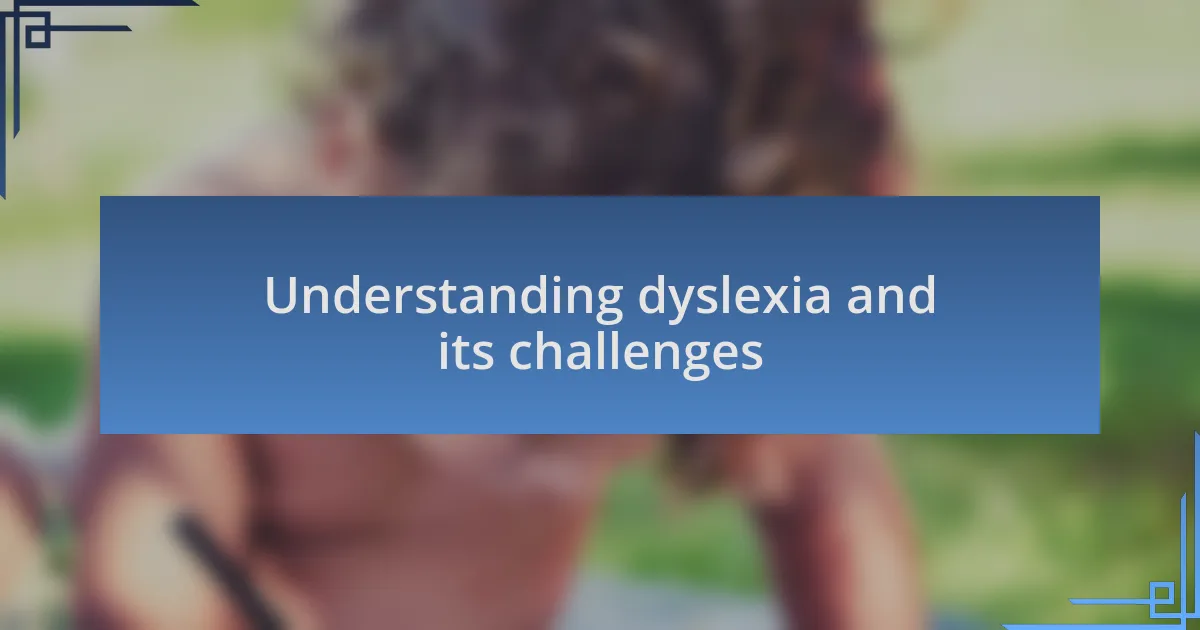
Understanding dyslexia and its challenges
Dyslexia is often misunderstood as simply a reading disability, but its effects can extend far beyond the page. I remember working with a student who had brilliant ideas but struggled to articulate them in writing. Have you ever felt that disconnect between your thoughts and your ability to express them? For many with dyslexia, this is a daily reality that feeds into feelings of frustration and inadequacy.
The challenges faced by individuals with dyslexia can be both emotional and academic. I’ve seen firsthand how difficulty in processing written information can lead to a lack of confidence in the classroom. When I engaged with learners during workshops, their eyes would often reflect the profound sense of struggle they felt. It’s heartbreaking to think that the incredibly rich stories these individuals have to share might never be told simply due to how they process information.
Moreover, the accompanying anxiety and social pressures can be profound. Consider the relentless cycle: a tough reading task leads to poor performance, which can trigger anxiety and subsequently, avoidance of similar situations. In my own experience, I’ve met countless adults who avoided careers they loved simply because they believed their dyslexia would hold them back. Why should anyone have to choose between their passions and their reading abilities?
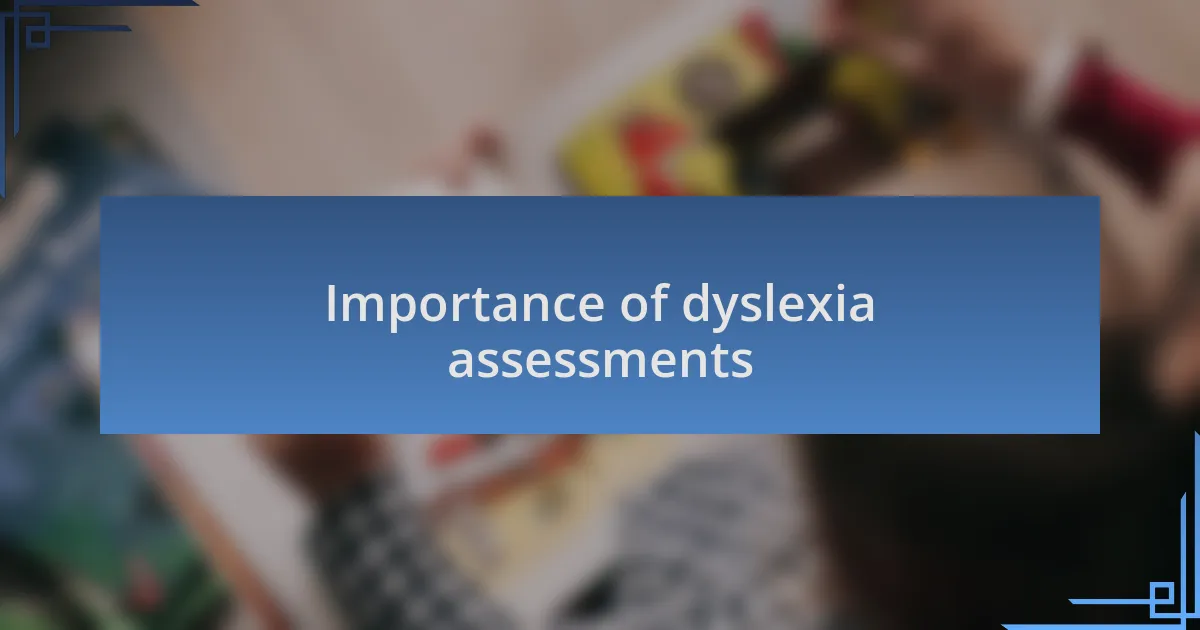
Importance of dyslexia assessments
Assessments for dyslexia play a crucial role in identifying individual learning profiles. When I worked with a child diagnosed with dyslexia, a thorough assessment revealed her unique strengths in problem-solving, which provided a foundation for personalized learning strategies. Have you ever noticed how understanding someone’s strengths can change the entire approach to their education?
Moreover, early identification through assessments can pave the way for timely interventions. I once participated in a program where a simple dyslexia screening changed a struggling student’s trajectory. Instead of floundering in confusion, he received targeted support that not only improved his reading but also revitalized his love for learning. Isn’t it incredible how a clear diagnosis can illuminate the path forward?
Finally, assessments don’t just benefit the individual; they serve as vital tools for educators and parents alike. I recall guiding a parent through the assessment results of her son, and her relief was palpable once she understood he had a tailored roadmap to success. Without these assessments, how can we expect to address the nuanced needs of learners who often feel lost in a system designed for others?
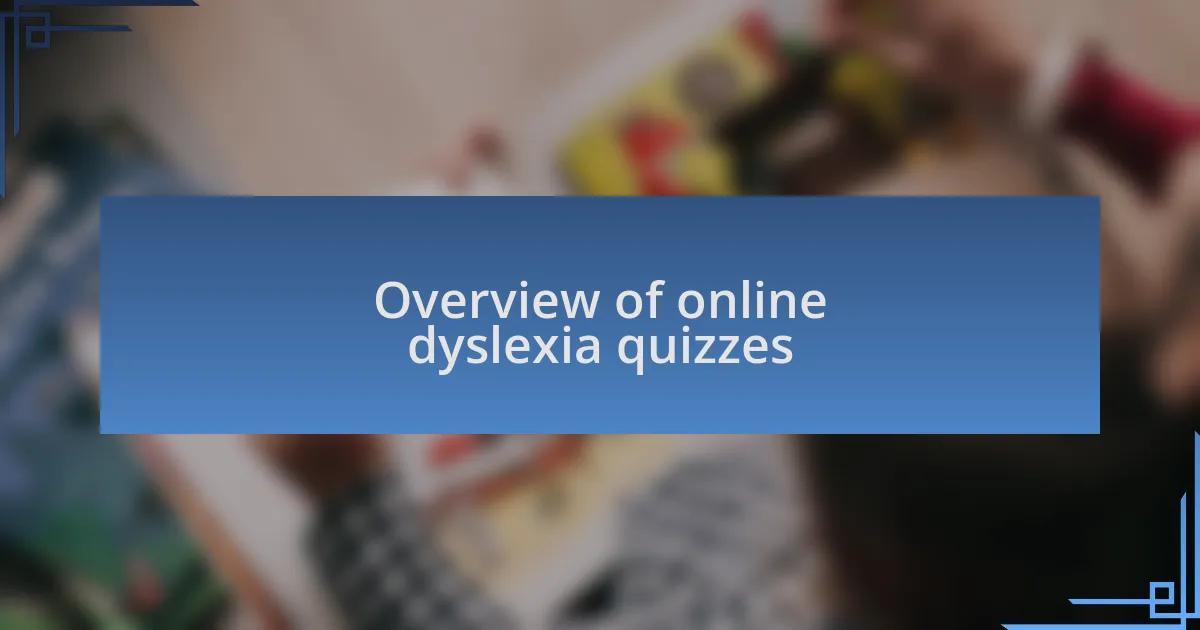
Overview of online dyslexia quizzes
Online dyslexia quizzes serve as valuable preliminary tools for individuals seeking to understand their reading and learning challenges. I remember taking one of these quizzes myself, and even though it wasn’t a formal diagnosis, it opened my eyes to specific areas where I struggled. Isn’t it fascinating how a few simple questions can prompt a personal exploration into one’s learning journey?
Many of these quizzes offer insights that can guide users toward seeking professional assessments. There was a time when a friend of mine used an online quiz and discovered patterns in her reading difficulties that mirrored those of her daughter, prompting them to pursue further evaluation. Have you ever considered the ripple effect such realizations can have on a family’s approach to education?
While these quizzes can be an excellent starting point, they are not substitutes for professional assessments. In my experience, using quizzes as a first step can empower individuals by building awareness and fostering discussions about dyslexia. How often do we overlook such resources that can make the initial steps towards understanding dyslexia feel less daunting?
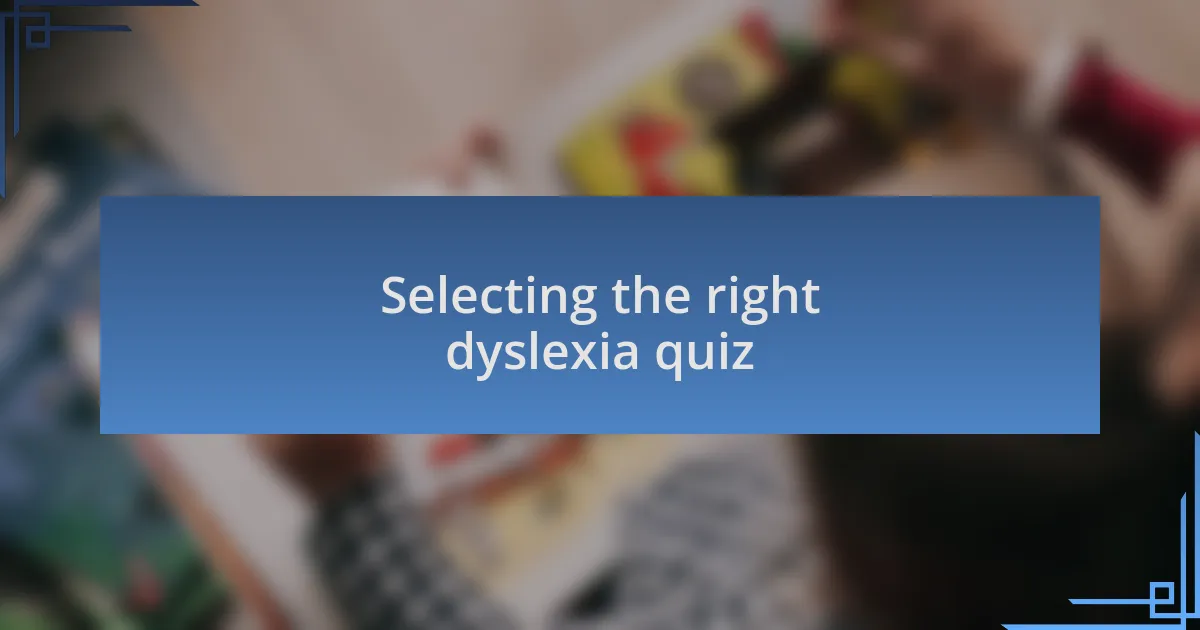
Selecting the right dyslexia quiz
When selecting the right dyslexia quiz, I recommend looking for those that provide a comprehensive overview of various symptoms and characteristics of dyslexia. I once came across a quiz that not only focused on reading difficulties but also touched upon aspects like memory and organizational skills. It made me realize the broader implications of dyslexia, and I wondered, how often do we limit our understanding to just reading challenges?
It’s also crucial to consider the source of the quiz. I remember taking a quiz from a well-known educational site, which offered well-researched questions that truly resonated with my experiences. The credibility of the source can significantly influence the quiz’s accuracy and usefulness in guiding you towards professional help. Are we sometimes too quick to trust informal quizzes that lack scientific backing?
Lastly, think about your personal goals in taking the quiz. Whether it’s to gain clarity on your reading challenges or to find resources for your child, ensure that the quiz aligns with your needs. I vividly recall taking a quiz before meeting with a specialist; it provided me with valuable talking points that made our discussion more productive. Isn’t it empowering when you can walk in with insights that can guide the conversation?
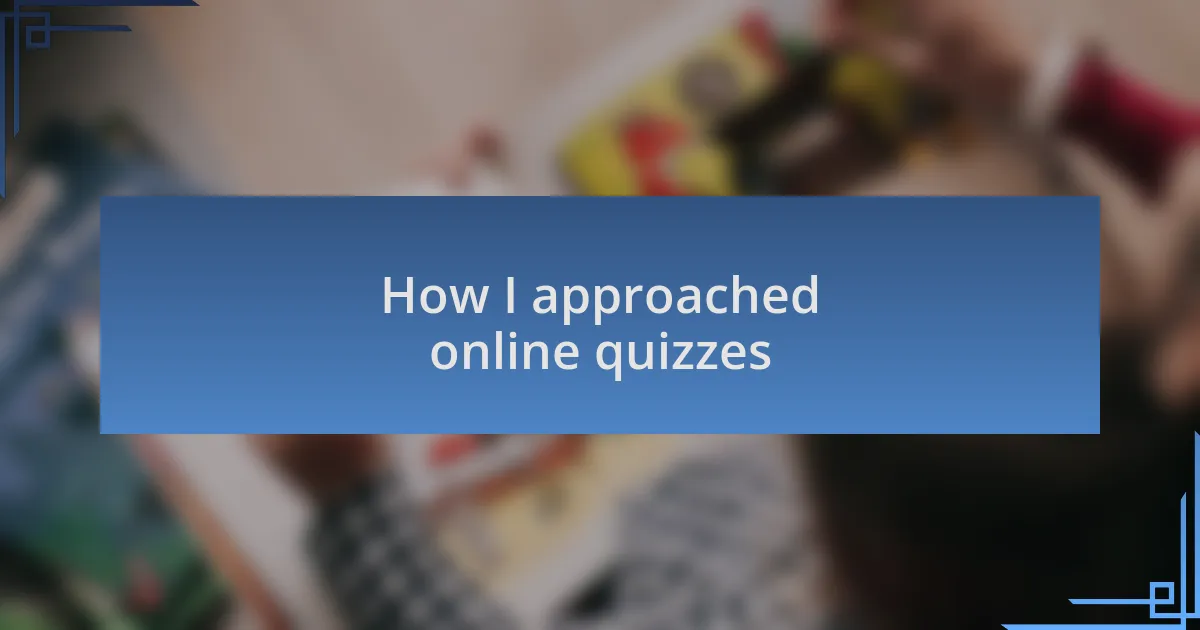
How I approached online quizzes
When I decided to dive into online dyslexia quizzes, my approach was methodical. I set aside some quiet time, recognizing the importance of focus while answering the questions. I found that eliminating distractions not only helped me engage with the content fully but also prompted me to reflect on my own experiences more deeply. Isn’t it fascinating how such a simple step can enhance self-awareness?
As I progressed through various quizzes, I started to pay attention not just to my scores but to the nuances of each question. I recall one quiz that asked about my experiences with sound processing in reading. That particular question struck a chord with me; it made me think back to moments in school where I struggled to follow along. Reflecting on that, I realized how our past experiences shape the way we interpret the present. Have you ever had an epiphany from something so seemingly straightforward?
Ultimately, my journey with these online quizzes became more than just a series of assessments; it became a personal exploration. I took some time to jot down my feelings and insights after each quiz, which helped solidify my understanding of dyslexia’s impact on my life. It was like piecing together a puzzle, where every answer contributed to a clearer picture of myself. Have you considered how valuable it can be to document your journey along the way?
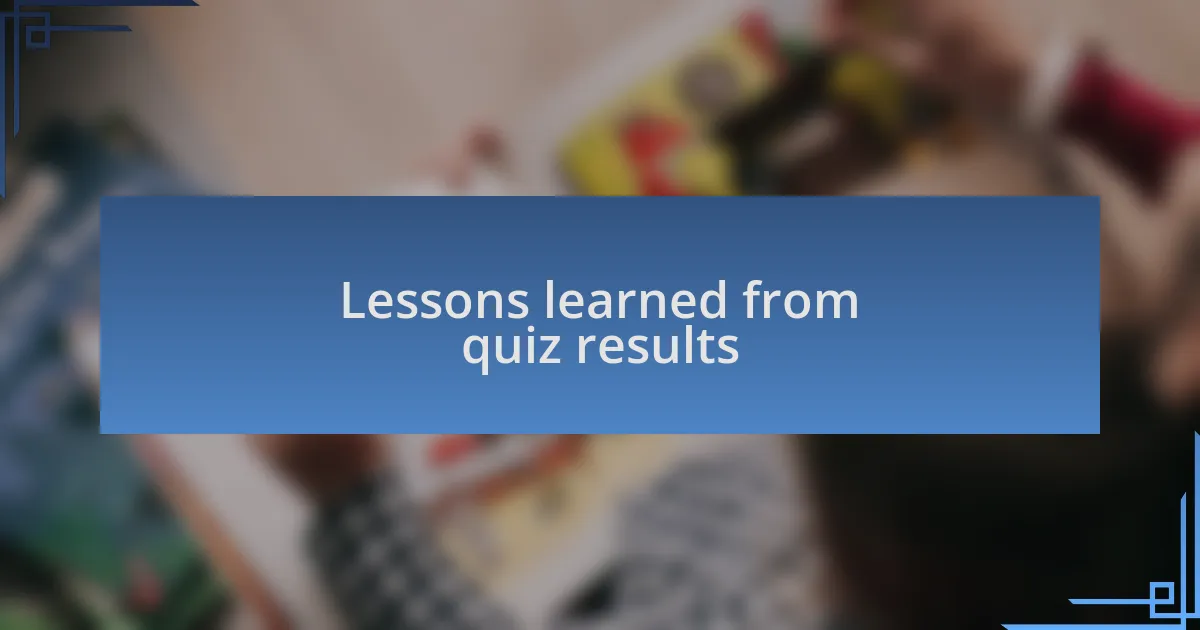
Lessons learned from quiz results
As I analyzed the results from various dyslexia quizzes, I couldn’t help but notice patterns in my responses that echoed my daily struggles. For instance, one quiz highlighted my difficulties with phonemic awareness, prompting me to recollect how often I mispronounced words during class presentations. It was an eye-opener; recognizing these specific challenges allowed me to focus on targeted strategies for improvement. Have you ever connected the dots between a quiz outcome and your real-life experiences?
What struck me most was the emotional resonance behind the scores. After completing one particular quiz, I felt a wave of validation wash over me. The high number of traits that aligned with my own experiences made me realize I wasn’t isolated in this journey. Knowing there’s a community of others who share similar trials can be immensely comforting. Can you think of a time when learning about someone else’s experience made you feel less alone?
One crucial lesson I derived from the quiz results was the importance of self-advocacy. Armed with newfound knowledge about my traits and tendencies, I felt empowered to communicate my needs more effectively. This newfound voice enabled me to seek additional resources and support from educators, which ultimately enhanced my learning experience. How has understanding your strengths and challenges influenced your interactions with others?
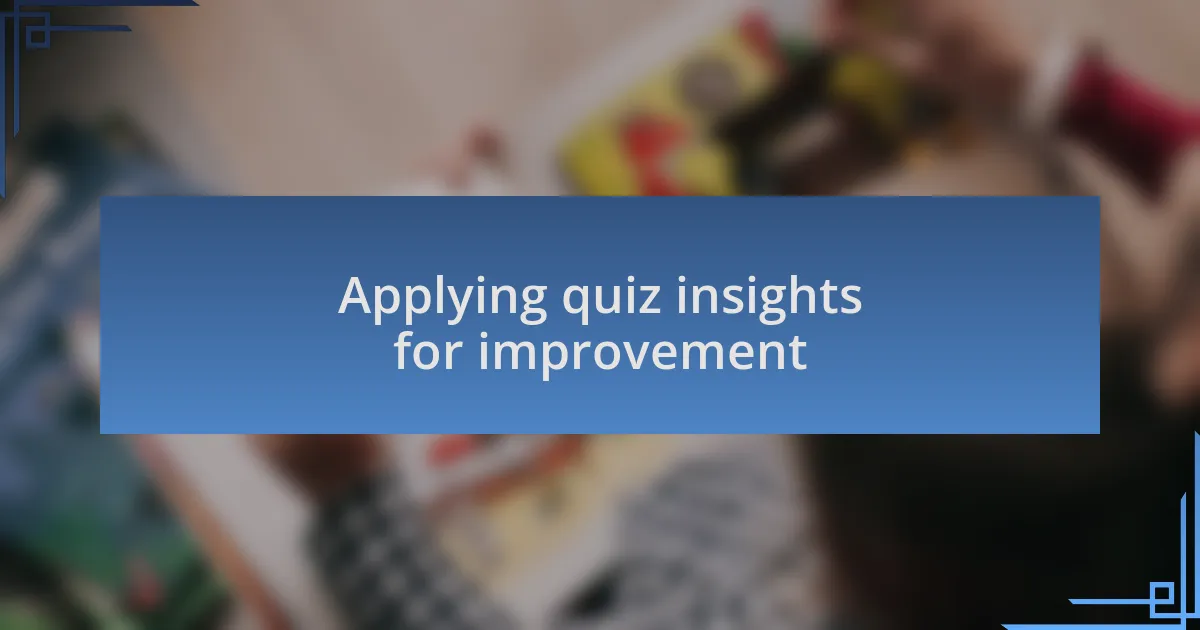
Applying quiz insights for improvement
Recognizing the specific areas for improvement from the quizzes helped me implement targeted practices in my daily routine. For example, discovering that I struggled with processing speed motivated me to incorporate more time management strategies into my studies. Have you ever considered how small changes in your approach could lead to big improvements?
Reflecting on my quiz insights, I began using mnemonic devices and visualization techniques which truly revolutionized my learning process. I remember vividly one night when I struggled to remember a list of terms for an upcoming test. By creating a simple song with the terms embedded in it, I found that not only did I memorize them, but I also enjoyed the process more. Have you ever found joy in a unique method of learning?
Additionally, the awareness gained from these quizzes urged me to seek out resources that aligned with my identified needs. I stumbled upon an online forum where people shared tips and strategies tailored to specific traits, and it was enlightening. How often do we underestimate the power of community support in our learning journeys? By sharing experiences, we not only find solidarity but also practical tools that enhance our progress.